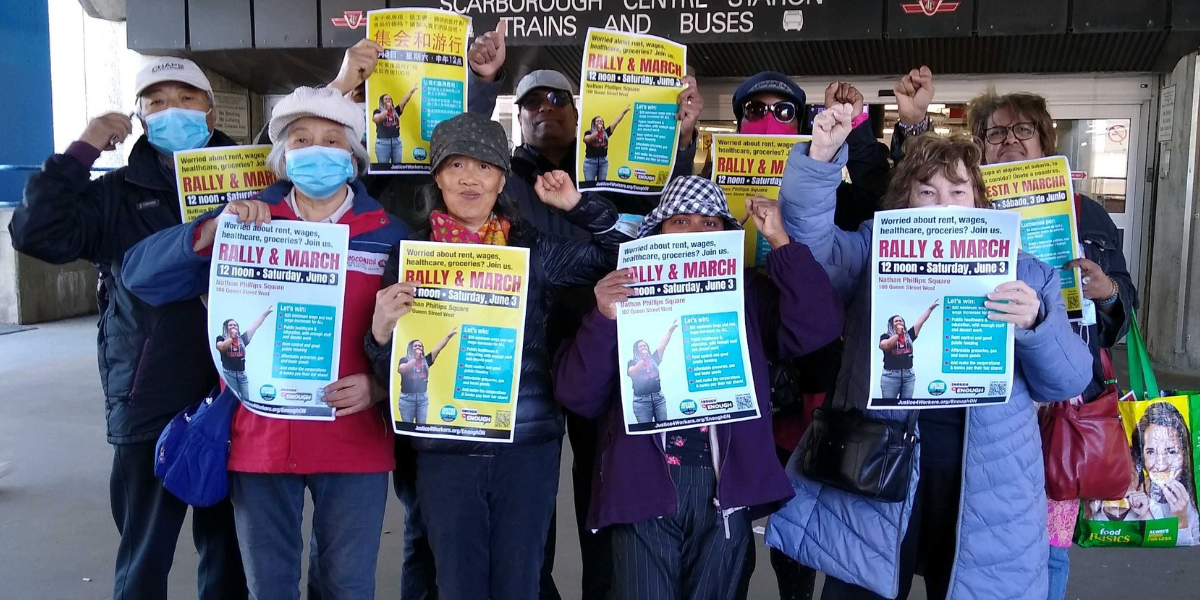On Saturday, June 3, workers across Ontario will mobilize in the Enough is Enough Day of Action against the cost-of-living crisis.
We say Enough is Enough because we can no longer wait for a world where nobody gets left behind. We need a struggle and politics that centre our fight for racial and economic justice as we build mass movements against the cost-of-living crisis endured by workers.
On June 3, we march to oppose structural racism defined by overwhelming poverty and state violence. We march to oppose a crisis defined by astronomical food prices, unaffordable housing, and chronically low wages.
Race is built into economic inequality
We know that race is much more than an identity. Race is a structure of power that keeps us from accessing the mainstays of economic life, a form of state violence that ensures that BIPOC people visit food banks at disproportionate rates, with 45.8 percent of food bank users citing the cost of food as their reason for using food banks and 13.2 percent citing the cost of housing.
But these disparities are hardly a mistake, resulting from successive governments prioritizing austerity budgets at all costs. As living conditions in our communities deteriorated, we struggled with interpersonal violence, substance abuse, and mental illness—exacerbating all of the conditions that the police use to justify heavy patrols in our neighbourhoods in the first place. The persistence of unemployment, underemployment, and under-resourced public services has created the pretext for entrenching heavy police patrols in Black and racialized communities across Toronto.
We have lived from one crisis to the next—the pandemic brackets today’s suffering, police brutality, and the emergency of mass evictions. Communities already under the boot of structural racism were the hardest hit by the pandemic as “essential workers” who tended to the sick, grew our food, and stocked our supermarket shelves were forced to risk their lives but denied essential protections like paid sick days by the provincial government. The pandemic caused us to finally recognize the depth of disparities from health and housing to workplace protections and public transit that structure the lives of racialized people.
Even before the pandemic, unaffordable housing gutted the stability we desperately need. In Toronto, data from 2016 reveals that the neighbourhoods with the highest evictions-per-hundred-tenants were predominantly Black communities, with the top five communities where landlords file eviction applications found in Jane and Finch, Rexdale, and Scarborough.
Cuts to public transit deepen our isolation, with more than 80 percent of impacted routes running through racialized neighbourhoods with higher poverty and unemployment rates. Fare hikes are enforced by TTC security that routinely targets Black commuters; a report from 2008-2018 revealed that Black people were targeted in 19 percent of all fare enforcement “incidents,” despite making up 8.8% of the general population.
Racialized workers are building the struggle
But racialized workers have always fought against an economic future that offers us nothing. Looking towards June 3 and beyond, we take inspiration from the racialized workers who stood their ground against the Ford government in November 2022. They give us the confidence that when we are organized and united, we can win against all odds.
We say Enough is Enough because we must engage the life and death struggles of the people building a mass movement beyond June 3. We use every opportunity to engage our community members and to develop our confidence together to engage in struggle.
We refuse to lower our expectations. On June 3, we march—inspired by hope and courage, not bitterness and despair. Brick-by-brick, we are building a multi-racial working-class movement with the struggle against oppression at its core.
Did you like this article? Help us produce more like it by donating $1, $2, or $5. Donate

